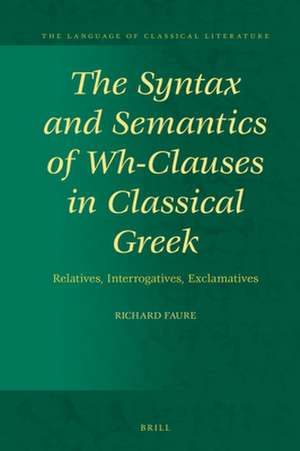The Syntax and Semantics of Wh-Clauses in Classical Greek: Relatives, Interrogatives, Exclamatives: The Language of Classical Literature, cartea 34
Autor Richard Faureen Limba Engleză Hardback – 22 sep 2021
Preț: 536.28 lei
Preț vechi: 653.99 lei
-18% Nou
Puncte Express: 804
Preț estimativ în valută:
102.61€ • 107.15$ • 84.74£
102.61€ • 107.15$ • 84.74£
Carte indisponibilă temporar
Doresc să fiu notificat când acest titlu va fi disponibil:
Se trimite...
Preluare comenzi: 021 569.72.76
Specificații
ISBN-13: 9789004467521
ISBN-10: 9004467521
Dimensiuni: 155 x 235 mm
Greutate: 0 kg
Editura: Brill
Colecția Brill
Seria The Language of Classical Literature
ISBN-10: 9004467521
Dimensiuni: 155 x 235 mm
Greutate: 0 kg
Editura: Brill
Colecția Brill
Seria The Language of Classical Literature
Cuprins
Preface
List of Tables and Figures
1 The Landscape of Wh-clauses in Classical Greek
1Three Paradigms of wh-items in Classical Greek
2The Nature of wh-items
3What This Book Is Not About
4About the Chapters of This Book
2 Ὅς/ὅστις Form a Pair of Complementary Items
1The Uses
2The Difference between ὅς and ὅστις
3Generalizing: The Notion of Identification
4Conclusion
3 Bringing Τίς into the Picture
1Uses Common to τίς and ὅστις
2Τίς and ὅστις in Indirect Interrogative Clauses
3Ὅστις Meaning
4Τίς Meaning
5Conclusion
4 The Clash between Definite Terms and Ὅστις as Pragmatic Disagreement
1Ὅστις Meaning: A Nonidentificational Item
2Distribution of the Sequence [Definite Term + ὅστις]
3‘Causal’ ὅστις as an Illocutionary Operator
4Illocutionary ὅστις Is Nonidentificational
5Conclusion
5 Complement Wh-clauses and the Predicates That Embed Them
1Interrogative-Embedding Predicates in the Landscape of Propositional Attitude Predicates
2Classification Based on Denotations of Interrogative Clauses
3The Distribution of Interrogative-Embedding Predicates in Classical Greek
4Conclusion
6 Τίς (and Ὅστις) in Unselected Embedded Questions
1Wh- vs. Yes/No-Unselected Embedded Questions
2Previous Approaches to wh-UEQs
3The Left Periphery of wh-UEQ
4A Type-Shifting Account for wh-UEQs
5Concluding Remarks
7 The Origin of Ὅς Interrogatives
1Ὅς Clauses as Interrogatives
2Ὅς Clauses Appear after Resolutive Predicates
3Resolutive Predicates in Nonveridical Environments
4Resolutive/Cognitive Factive Predicates and ὅς Clauses
5From Relative to Interrogative Clauses
6Concluding Remarks
8 Wh-exclamative Clauses
1Classical Greek Data
2Exclamatives as Presupposed Propositions
3Focus: What We Learn from Syntax
4Scalarity, Degree, Widening and Unexpectedness
5Concluding Remarks
9 The Ups and Downs of Classical Greek Wh-items
1Identification as the Key Notion
2Semantic vs. Traditional Syntactic Classification in Relatives, Interrogatives, Exclamatives
3Three Words of Diachrony
4Final Word
Appendix: Constructions and Classification of Interrogative-Embedding Predicates
References
Index Locorum
Index Notionum et Rerum
List of Tables and Figures
1 The Landscape of Wh-clauses in Classical Greek
1Three Paradigms of wh-items in Classical Greek
2The Nature of wh-items
3What This Book Is Not About
4About the Chapters of This Book
Part 1 The Framework
2 Ὅς/ὅστις Form a Pair of Complementary Items
1The Uses
2The Difference between ὅς and ὅστις
3Generalizing: The Notion of Identification
4Conclusion
3 Bringing Τίς into the Picture
1Uses Common to τίς and ὅστις
2Τίς and ὅστις in Indirect Interrogative Clauses
3Ὅστις Meaning
4Τίς Meaning
5Conclusion
Part 2 Marginal Cases
4 The Clash between Definite Terms and Ὅστις as Pragmatic Disagreement
1Ὅστις Meaning: A Nonidentificational Item
2Distribution of the Sequence [Definite Term + ὅστις]
3‘Causal’ ὅστις as an Illocutionary Operator
4Illocutionary ὅστις Is Nonidentificational
5Conclusion
5 Complement Wh-clauses and the Predicates That Embed Them
1Interrogative-Embedding Predicates in the Landscape of Propositional Attitude Predicates
2Classification Based on Denotations of Interrogative Clauses
3The Distribution of Interrogative-Embedding Predicates in Classical Greek
4Conclusion
6 Τίς (and Ὅστις) in Unselected Embedded Questions
1Wh- vs. Yes/No-Unselected Embedded Questions
2Previous Approaches to wh-UEQs
3The Left Periphery of wh-UEQ
4A Type-Shifting Account for wh-UEQs
5Concluding Remarks
7 The Origin of Ὅς Interrogatives
1Ὅς Clauses as Interrogatives
2Ὅς Clauses Appear after Resolutive Predicates
3Resolutive Predicates in Nonveridical Environments
4Resolutive/Cognitive Factive Predicates and ὅς Clauses
5From Relative to Interrogative Clauses
6Concluding Remarks
8 Wh-exclamative Clauses
1Classical Greek Data
2Exclamatives as Presupposed Propositions
3Focus: What We Learn from Syntax
4Scalarity, Degree, Widening and Unexpectedness
5Concluding Remarks
9 The Ups and Downs of Classical Greek Wh-items
1Identification as the Key Notion
2Semantic vs. Traditional Syntactic Classification in Relatives, Interrogatives, Exclamatives
3Three Words of Diachrony
4Final Word
Appendix: Constructions and Classification of Interrogative-Embedding Predicates
References
Index Locorum
Index Notionum et Rerum
Notă biografică
Richard Faure (Phd, Sorbonne 2010) is Maître de conférences (associate professor) at Université Côte d'Azur. He specializes in Ancient and general linguistics. He published extensively on subordination at the syntax/semantics interface on Greek, but also on Armenian, French, Occitan.






